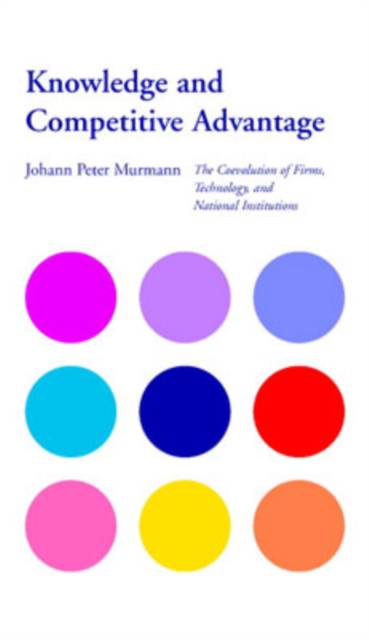
Door een staking bij bpost kan je online bestelling op dit moment iets langer onderweg zijn dan voorzien. Dringend iets nodig? Onze winkels ontvangen jou met open armen!
- Afhalen na 1 uur in een winkel met voorraad
- Gratis thuislevering in België vanaf € 30
- Ruim aanbod met 7 miljoen producten
Door een staking bij bpost kan je online bestelling op dit moment iets langer onderweg zijn dan voorzien. Dringend iets nodig? Onze winkels ontvangen jou met open armen!
- Afhalen na 1 uur in een winkel met voorraad
- Gratis thuislevering in België vanaf € 30
- Ruim aanbod met 7 miljoen producten
Zoeken
Knowledge and Competitive Advantage
The Coevolution of Firms, Technology, and National Institutions
Johann Peter Murmann
€ 142,95
+ 285 punten
Uitvoering
Omschrijving
Entrepreneurs, managers, and policy makers must make decisions about a future that is inherently uncertain. Since the only rational guide for the future is the past, analysis of previous episodes in industrial development can shape informed decisions about what the future will hold. Historical scholarship that seeks to uncover systematically the causal processes transforming industries is thus of vital importance to the executives and managers shaping business policy today. With this in mind, Johann Peter Murmann compares the development of the synthetic dye industry in Great Britain, Germany, and the United States through the lenses of evolutionary theory. The rise of this industry constitutes an important chapter in business, economic, and technological history because synthetic dyes, invented in 1856, were the first scientific discovery quickly to give rise to a new industry. Just as with contemporary high tech industries, the synthetic dye business faced considerable uncertainty that led to many surprises for the agents involved. After the discovery of synthetic dyes, British firms led the industry for the first eight years, but German firms came to dominate the industry for decades; American firms, in contrast, played only a minor role in this important development. Murmann identifies differences in educational institutions and patent laws as the key reasons for German leadership in the industry. Successful firms developed strong ties to the centers of organic chemistry knowledge. As Murmann demonstrates, a complex coevolutionary process linking firms, technology, and national institutions resulted in very different degrees of industrial success among the dye firms in the three countries.
Specificaties
Betrokkenen
- Auteur(s):
- Uitgeverij:
Inhoud
- Aantal bladzijden:
- 318
- Taal:
- Engels
- Reeks:
Eigenschappen
- Productcode (EAN):
- 9780521813297
- Verschijningsdatum:
- 10/11/2003
- Uitvoering:
- Hardcover
- Formaat:
- Genaaid
- Afmetingen:
- 160 mm x 235 mm
- Gewicht:
- 557 g

Alleen bij Standaard Boekhandel
+ 285 punten op je klantenkaart van Standaard Boekhandel
Beoordelingen
We publiceren alleen reviews die voldoen aan de voorwaarden voor reviews. Bekijk onze voorwaarden voor reviews.











